Are women really equal in the matrilineal society of Meghalaya?
No women pastors. Gender imbalance in Khasi dorbars. Men ashamed of women running the show. Is the Presbyterian church mirroring matrilineal Meghalaya’s growing male bias?
“Adam’s rib is a good place to begin the Story of Creation,” says Martha Mary as tea is poured into cups in a room at a presbytery over which a brief rain is falling. “But there are two versions,” says the elderly office-bearer of a women’s wing of the Presbyterian church in Shillong. “The first version says God made Man, and the Woman comes from his rib. In another version, because it is so, women are more refined…. Men and women have not been considered equal but the church does give women opportunities.”

The subtext: As a woman committed to the church, you might not get paid as a priest does, but serve Jesus and you will be happy.
The other women in the room - a theologian, who has put together a women’s association to press for equal gender rights; teachers, who hint at the church’s tradition of voluntary services or unpaid labour for women; a former office-bearer of a church organisation who says women have no role in policy-making - agree to this summing up. But only up to a point.
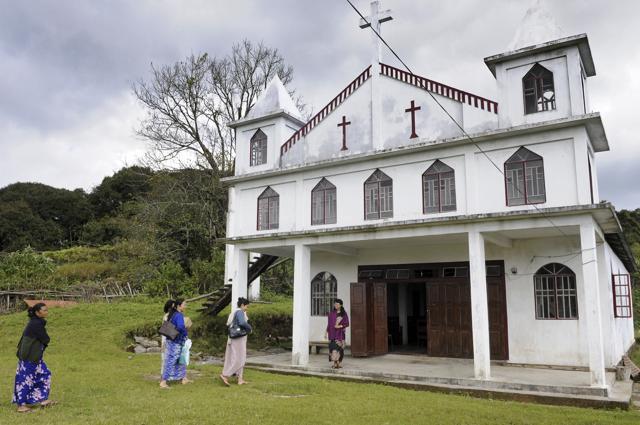
If a slow-creeping patriarchy in the matrilineal Khasi society of Meghalaya is being mirrored in church practices, this dirty secret is, however, not to be revealed all at once to a stranger. They did not consider themselves rebels, but as people caught up in a family quarrel. “We are under male dominance but we are not oppressed,” says Ladbasuk, a teacher at a theological college in Shillong. “We are simply asking that women be ordained and be allowed to become pastors like men.”
Behind the scenes
The situation is ironic considering that Khasi society (Khasis are the largest group of Meghalaya’s Christian-dominated tribal population of which 70 per cent are Presbyterians) is one of the oldest practitioners of matriliny under which family lineage comes from the mother, and family and social control, one assumes, flows from the same source. Matriliny has, however, become akin to an ad for Meghalaya but is not its reality no matter what outsiders think.
A girl with a necklace of fried fish around her neck, and a child balancing kitchen utensils on her head against the backdrop of a Meghalaya village are examples of recent images of ‘girl power’ shot by Karolin Kluppel, a German photographer. They have been exhibited at a recently concluded photo festival in Delhi and have enjoyed wide circulation in international media. Such visuals seen out of context obscure the fact of women’s absence or subordinate role in traditional power structures like the Khasi dorbar and formal institutions like the legislative assembly. “Women are the custodians of family wealth but not owners. The uncle is the one who actually decides,” says Iaonom Nongrum, a former assistant chaplain who was leading a congregration in Chandigarh but returned home to a diminished role. She is now a student councillor attached to a local church. Though not unhappy at work, Iaonom admits “it’s kind of slow. Unlike the pastoral ministry, it’s not an active job.”
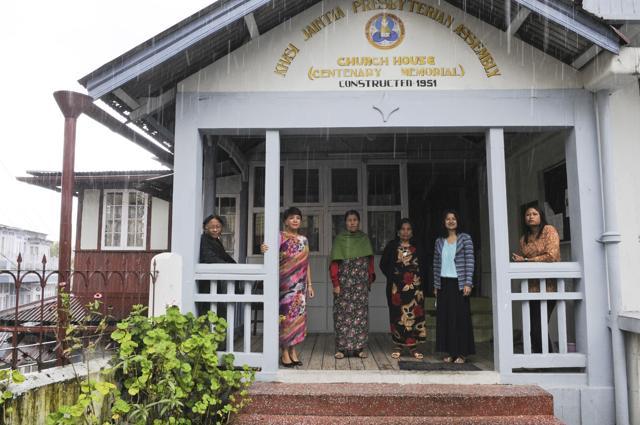
The twinning of the Presbyterian church with the growing conservatism in Khasi society has impacted women’s prospects within the church. It has dimmed the church’s good work in health and education, says Tarun Bhartiya, a well-known Shillong-based filmmaker and publisher who is married into a Khasi family.
Syngkhong Rympei Thymmai (Forging New Hearth and Home), a nineties movement, now marginalised, that had the backing of some of the state’s ministers, still pops up at village bazaars or town centres to distribute its brochures to demand a ‘going back’ to a patrilineal setup. An upswing in migration and a growing acquaintance with social set-ups outside the state where patriarchy and patriliny are norm have Khasi men embarrassed about their society’s egalitarianism, adds Bhartiya.
The real fear about giving women equal footing in society and church, say progressive Khasi men, is that men fear they will lose power on both fronts - women have more power at home, now they can’t be running the show outside as well! “We work so hard. But I have to refer to her about everything,” says a pastor in Shillong convinced about his right to be outraged. A silver lining, he adds, are the recent, though few, examples of children adopting double-barred surnames - of both parents. Men will be ‘breeding bulls’ no more. And aren’t there chances of women usurping family property, especially if she marries an outsider?
There are breaks and continuity in the system of matriliny, and these days each family has been negotiating change in its own way. But exceptions, says writer Avner Pariat, are used by masculinists to bat for patriliny and its grip over the church. A good exception to learn from, on the other hand, is the recent appointment of a female pastor by the Church of God, a Protestant Church denomination, in Jowai, 60 km from Shillong.
The church has to face up to its own conflicts, says Pariat. “It was inconceivable once upon a time that you could have a Khasi dance in a Presbyterian concert or use traditional instruments in church ceremony. It is the people who can force the church to become something else,” he adds.
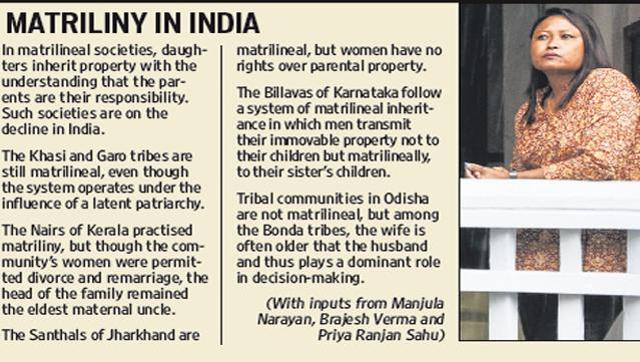
Barbara Kharpuri, a woman theologian, draws hope from the fact that the present generation of students of both genders are questioning the gender imbalance. “It’s not just an academic discourse,” she says. “Where the Women’s wings’ work is concerned, here too, men make the decisions. Women are not free to take decisions on their own,” she adds. From her own batch of theology graduates, most of her male fellow-students, are now pastors.
A pastor in middle-class Meghalaya is indeed a big deal. It’s a matter of honour and immense social capital. As Reverend Kyrsoibor Pyrtuh, a progressive male pastor says in good humour: “A pastor is hot property in the marriage market.” Would he back a woman to be a pastor? The answer: “It hasn’t been done before” sounds like a ‘no’ but it could actually mean a ‘yes’. Pyrtuh says he feels pulled in between ‘sacred’ and ‘secular’ considerations but adds that women must “take the lead in the matter”.
Conservatism is not just the male pastors’ burden, even though there have been stray examples of senior pastors telling promising women theology graduates that “pastorship is possible once you cross the child-bearing stage”. Academic Gertrude Lamare in her article in the magazine, Riaot, writes that many of her interviewees confessed that the challenge to their demands “also comes from women members of the Church, including the women’s wings. It is quite impossible to see the women’s wings as platforms on which the issue of women’s integration would be discussed because majority of the women members are satisfied with the status quo. Thus, there is an internalised patriarchal attitude even among women, which turn them into stumbling blocks in other women’s paths”.
Signs of some change
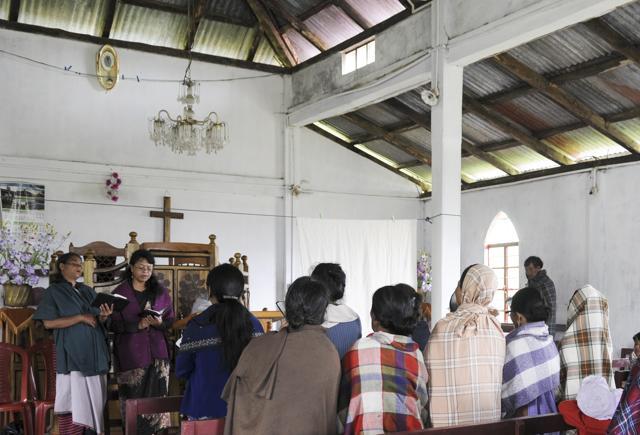
Unlike in the cities, rural areas such as Nongjri, Rangthong and Pariong have accepted women as members of their respective congregation committees. Bakordor W. Bannett, the wife of a pastor, and an elected committee member of a local church in Pariong, says, “There are now nine elected women committee members under the Pariong local church.” A 70-member group of women theologians have also been formed to push for women in administrative positions. The Presbyterian church-run Women’s Fellowship programme, which unkind people say is just about organising tea parties and looking after neighbourhood cleanliness and flower arrangements at social functions, is trying to do more. It is filing reports highlighting women representation in local bodies. A few women are also being allowed to preach from the pulpit.
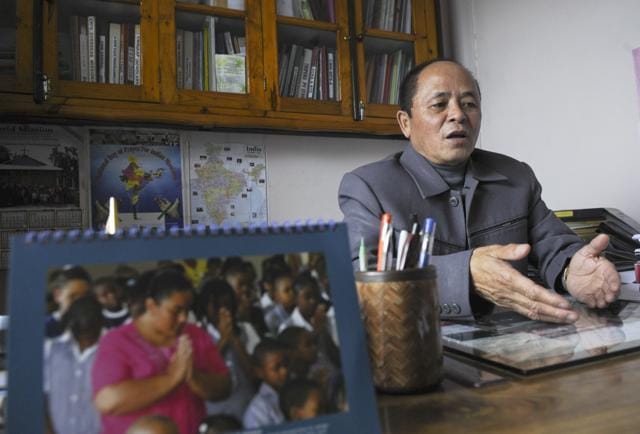
“The church’s constitution does not bar a woman from being a pastor,” says David T Lhovum, senior administrative secretary of the Presbyterian Church of India. “So that door is not closed. But it might take another 10 years.” In the interim, they must keep on talking about it while making the tea.





